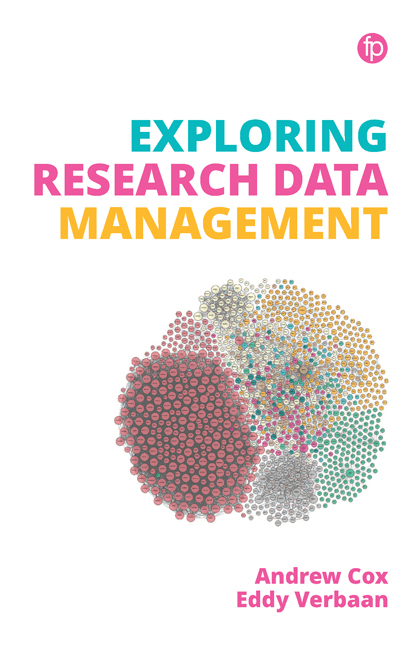Book contents
- Frontmatter
- Contents
- List of tables and figures
- 1 Introducing Research Data Management
- 2 The Social Worlds of Research
- 3 What Are Research Data?
- 4 Case Study of RDM in an Environmental Engineering Science Project
- 5 RDM: Drivers and Barriers
- 6 RDM as a Wicked Challenge
- 7 Research Data Services
- 8 Staffing a Research Data Service
- 9 Requirements Gathering for a Research Data Service
- 10 Institutional Policy and the Business Case for Research Data Services
- 11 Support and Advice for RDM
- 12 Practical Data Management
- 13 Data Management Planning
- 14 Advocacy for Data Management and Sharing
- 15 Training Researchers and Data Literacy
- 16 Infrastructure for Research Data Storage and Preservation
- 17 Evaluation of RDS
- 18 Ethics and Research Data Services
- 19 A Day in the Life Working in an RDS
- 20 Conclusion: the Skills and Mindset to Succeed in RDM
- Index
18 - Ethics and Research Data Services
Published online by Cambridge University Press: 21 September 2019
- Frontmatter
- Contents
- List of tables and figures
- 1 Introducing Research Data Management
- 2 The Social Worlds of Research
- 3 What Are Research Data?
- 4 Case Study of RDM in an Environmental Engineering Science Project
- 5 RDM: Drivers and Barriers
- 6 RDM as a Wicked Challenge
- 7 Research Data Services
- 8 Staffing a Research Data Service
- 9 Requirements Gathering for a Research Data Service
- 10 Institutional Policy and the Business Case for Research Data Services
- 11 Support and Advice for RDM
- 12 Practical Data Management
- 13 Data Management Planning
- 14 Advocacy for Data Management and Sharing
- 15 Training Researchers and Data Literacy
- 16 Infrastructure for Research Data Storage and Preservation
- 17 Evaluation of RDS
- 18 Ethics and Research Data Services
- 19 A Day in the Life Working in an RDS
- 20 Conclusion: the Skills and Mindset to Succeed in RDM
- Index
Summary
Aims
The aim of this chapter is to consider the ethical dimensions of work in RDM.
An ethical service
Like any area of professional work, RDM has its ethical basis and its own ethical dilemmas and challenges.
Many who work in the area of RDM are driven by a strong belief in the benefits of data sharing (or even open data) and its ability to improve science through replicability or transparency and the possibility of new research. Others are motivated by a simpler (but also ethical) desire to do good by providing an excellent service to research communities or by contributing to learning. Others have more pragmatic, less ethically based motives.
Whatever the basis for our belief in the importance of RDM, we should always ask questions about the demands being made on researchers by institutions and governments, and our own role in potentially enforcing these. Open data sounds like an inherently good thing. But there is the potential for it to be used as a means to disadvantage particular types of research, such as qualitative research, where gaining consent for re-use may in some cases affect participation rates negatively. It also has the potential to be used by senior academics to appropriate the work of more junior colleagues. This reflects the fact that any agenda can and will be used politically within a nexus of power in an organisation. More generally there may be systematic connections between the agenda to share data and control over research. Such issues of power relate to local situations within departments; equally they exist in the imbalance between Western institutions and in developing countries. Open access, especially gold open access − where the publisher makes the final published version openly available on their web site − seems to actually disadvantage developing countries. We should always be asking critical questions about equity and justice within digital scholarship.
Exploring further
What is the moral purpose of RDM for you? Do you see any tensions with other values that you hold? For example, do you see any conflicts between best practices in managing data and the need for researchers to have autonomy and freedom to do research as they believe is best? Are there potential conflicts around beliefs about who owns data?
- Type
- Chapter
- Information
- Exploring Research Data Management , pp. 173 - 178Publisher: FacetPrint publication year: 2018



